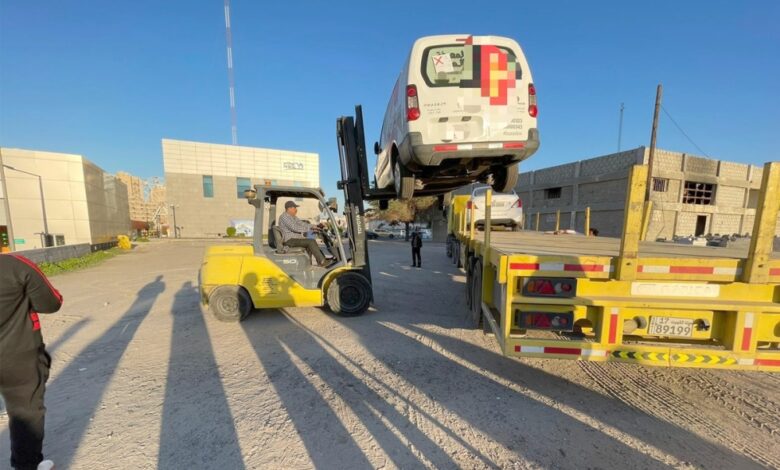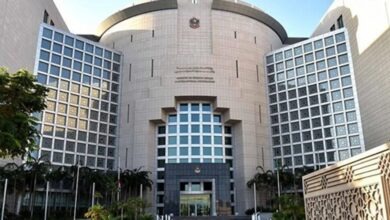Kuwait takes action on new rules for abandoned vehicles in Shuwaikh
The Kuwait Municipality proposed seven measures to enhance public appearance and security, including fines for negligence that distorts the public view in areas like schools and hospitals, as well as penalties for work regulation violations and misuse of public spaces.

• The proposals by the Kuwait Municipality included imposing hefty fines on anyone who encroaches on public spaces that contain any components of the state’s infrastructure, as well as nominal fees on service, craft, commercial, and industrial license holders to support afforestation, gardening, and preservation efforts.
After classifying discarded vehicles into three types and considering their potential use for storing corrupt goods, drugs, and housing residence violators, Kuwait Municipality emphasized the need for garage owners in the Shuwaikh area and craft and commercial service sectors to provide adequate space within their licensed premises for maintenance and repairs. If these abandoned vehicles are found in any of these areas for purposes other than those provided by licensed authorities or shops, they should be removed and stored in designated sites, according to Al Jarida newspaper.
In a document obtained by the newspaper, the municipality presented seven suggestions to combat this issue in order to maintain the country’s public appearance and ensure security. One notable proposal is the imposition of fines on anyone who distorts the public view in any region of the state through negligence, particularly in public areas such as schools, hospitals, and mosques. Additionally, fines would apply to those who violate work regulations in craft and industrial sectors and exploit public spaces for personal gain.
The proposals also included imposing hefty fines on anyone who encroaches on public spaces that contain any components of the state’s infrastructure, as well as nominal fees on service, craft, commercial, and industrial license holders to support afforestation, gardening, and preservation efforts.
Hawalli Governorate enforces 395 violations in September
The Municipality, represented by the Department of Public Hygiene and Road Works in the HawalliGovernorate, announced the issuance of 395 citations, including 100 for road occupations in Hawalli last September. They noted that 61 neglected vehicles were removed and sent to a designated holding site, stressing their zero tolerance for violations and infringements, with all legal procedures enforced against offenders.
The municipality stated that if an abandoned vehicle is found in one of the squares of the Shuwaikh area or within commercial service and irrigation zones for reasons other than those provided by the licensed entities or shops, it must be removed and taken to designated holding sites.
They pointed out that storage activities are permitted in the Shuwaikh area and commercial service irrigation, and that licenses for these activities can be obtained according to the regulations and requirements of the relevant authorities.
They added: “Given Kuwait Municipality’s commitment to maintaining the security of the area and ensuring the public view is free from any visual pollutants, as well as their aim to protect public resources from exploitation for personal gain, we propose increasing fines for anyone who distorts the public view in any area of the state by neglecting their vehicle, particularly in public sites such as schools, hospitals, and mosques. Additionally, we recommend raising fines for those who violate work regulations in craft and industrial areas or exploit public spaces for personal activities (e.g., waiting, maintenance, repair, etc.).”
The municipality identified the lack of parking requirements in industrial areas as one of the causes of the problem.
They also proposed imposing heavy fines on anyone who encroaches on public spaces containing state infrastructure components (such as transformers, piers, manholes, bridges, and columns) or the infrastructure itself. Furthermore, they suggested implementing nominal fees for holders of licenses in service, craft, commercial, and industrial sectors to support afforestation and park preservation, particularly targeting licenses for those engaging in economic activities. They are considering allocating specific public parking spaces for trucks, long-term parking, and multi-story parking in optimal locations to serve the community.
Additionally, the municipality proposed allowing multi-story parking lots to increase the height of the ground floor and allocate part of it for loading vehicles or medium and small trucks. They suggested requiring the construction of a multi-story car park to serve medium and large economic projects before electricity is delivered to those sites.
Sources pointed out that one of the reasons for the parking and traffic congestion problem in industrial areas is the lack of a requirement to provide parking in the construction system for industrial areas and factories. This allows for the construction of 100 percent of the ground floor without imposing a space for loading or parking, and in some areas, it permits construction to extend to all limits of the industrial lot.
Regarding the need for parking for workers in the Shuwaikh area, as well as for the service, artisanal, and commercial sectors, she stated, “One of the outputs of the study of the area, approved by the Municipal Council, is as follows: The general policy of the parking management strategy in the Shuwaikh area and commercial service sectors restricts parking on roads to designated areas on the side of the roads and limits parking on bus corridor paths and at high-quality bus stations to facilitate bus movement.
As a short-term measure, informal parking should be allowed on vacant lands and green spaces, and once these lands are developed, formal parking will be established in buildings and independent lots.
Additionally, the establishment of official parking on vacant land is essential due to the increase in demand, which occurs as the capacity of informal parking spaces declines when development begins on the same plot. This means that parking standards must be applied accurately to all aspects of development to ensure suitable parking space is available within the developed parcel, providing parking for employees and visitors, as well as space for large cargo vehicles associated with their use of the lot in question.
Daily rate of entry and exit of cars
The daily rate of entry and exit of cars at the municipal reservation sites is approximately 47 cars entering and 110 cars exiting.
5,700 neglected vehicles pile up in Kuwait Municipality’s reservation
The newspaper obtained statistics on the number of ‘neglected and violating’ vehicles in the municipality’s reservation, which totaled about 5,700 vehicles. These are distributed between the Al-Na’aim and Abdullah Port reservations, with 3,000 in Al-Na’aim and 2,700 in Abdullah Port. Additionally, the reservation contains other types of vehicles, such as boats, bicycles, mobile chalets, and more.
‘Sahel’ app alerts owners of neglected vehicles’ locations
Many owners of neglected vehicles suffer from the sudden loss of their vehicles due to not knowing their location. However, after investigation, it often turns out that the vehicles are in one of the municipality’s reservation sites.
Faiz Al-Mutairi, the Director of the Project Development Department at the Municipality, revealed the development of the neglected vehicle reservation system in Al-Na’aimand Mina Abdullah, in line with the municipality’s direction to digitize all transactions. This will be facilitated through an email alert in the government application ‘Sahel,’ allowing vehicle owners to know where their vehicles are being held and the maximum date before they are presented for auction.
Bus used as storage for materials
During the garbage and scrap lifting campaigns, one of the cleaning and road occupation teams removed a bus from one of the yards, discovering that it was being used as storage for various materials.
Long-term parking prohibited in several areas
According to the Road Occupancy Regulation, long-term parking is prohibited in several areas, and the municipality has the authority to tow vehicles parked in these locations. This includes parking lots for government agencies, hospitals and clinics, school parking lots, public squares, and association parking areas.













